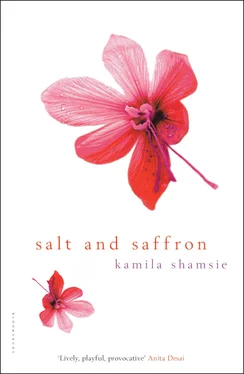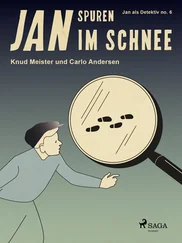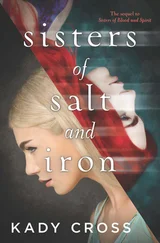‘I suppose I’ll have to, just so I can meet this mystery man. Does he look like a Greek god?’
‘A fat, bald octogenarian. I’m feeling very prudish now, so let’s change the subject.’
‘Prudish? You’ve asked me to come and stay in the house where the two of you live together.’
‘We do not. He lives with an old friend next door. Well, when any of my relatives come to stay he does. Now change the subject.’
I tried to imagine any of my friends having this kind of conversation with a great-aunt. Impossible. Usually it was people of Meher Dadi’s generation talking about marriage and people my age trying to change the subject.
‘There’s something I want to show you.’ I ran into Dadi’s room and brought out the picture, newly framed, from Baji’s flat. ‘I met Baji in London. She gave me this photograph. I thought Dadi should have it. I never know where I’ll find it when I go into her room. One day it’s by her bedside table, the next day on her dresser, the day after that it’s hidden away in a drawer.’
Meher Dadi took the picture in both hands and looked at it for only a moment before putting it face down on the coffee table. ‘I can’t look at it. It breaks my heart. Even now.’ She looked up at me. ‘Why is that? I can look without sadness at pictures of all the dead I’ve wept for — my parents, my husband, my childhood friends — but this picture, oh Aliya, I wish you hadn’t shown it to me.’
‘Dadi said the man in the centre is Taimur. Not Akbar.’
Meher Dadi’s face went blank. ‘Your Dadi and I were close to all three of the brothers.’
I knew that blank expression. I’d worn it often enough myself. ‘There’s something you’re not telling me.’
‘And you should respect that.’ Dadi swept into the room in her best imperious manner. ‘Meher, the painting of the palace is crooked. Why can’t you ever …’ The end of the sentence was lost in Meher’s hair as the sisters held each other and swayed back and forth, Meher’s arms around Dadi’s neck. For all their wrinkles and hanging flesh they looked unspeakably lovely. When they drew apart Dadi wiped a tear off her sister’s cheek; the action would have been merely efficient if it hadn’t taken that extra split-second to accomplish.
‘You arrive early just so you can catch me looking less than my best,’ Dadi sniffed. ‘I’m going to freshen up. Aliya will entertain you.’
Meher Dadi rolled her eyes. ‘Oh Apa, I’m not some beau coming to call on you.’
Dadi ignored that comment. Just before she left the room she said, ‘Tell Aliya about Partition.’
‘Which details?’
‘The ones she doesn’t know.’
She was trying to ensure I didn’t ask any more questions about Taimur. He had been gone for nine years by the time Partition took place and, despite my fascination with all family history, I really wasn’t interested in 1947 at that particular instant. But I couldn’t very well tell Meher Dadi that; not with what Partition had meant to her generation.
‘What do you know about the not-quites and nineteen forty-seven?’
Only that of all the twin stories, Akbar and Sulaiman’s was the one I never told to entertain crowds. Not for the same reason that I never told Mariam Apa’s story; no, Akbar and Sulaiman left no great mark on my psyche. Their story was just, well, boring. Judge for yourself: the two brothers (Taimur now long gone) disagreed politically. Akbar was a Leaguer, Sulaiman was a Congress man. One believed that Nehru and the Congress were dangerously power-hungry; the other believed the same of Jinnah and the League. The brothers fought; the fighting turned bitter. The whole family was drawn into the battle and forced to take sides — all other causes of division and unity among the Dard-e-Dils were forgotten, and all that remained were the Pakistan camp and the united-India camp. When Partition actually took place, one country coming to life on 14 August, the other on 15 August, the Dard-e-Dils sighed, said, ‘Born on opposite sides of midnight like Akbar and Sulaiman,’ and took that as a sign that the family rift was inevitable. It was the curse of the not-quites raining down on the Dard-e-Dils yet again, except this time, instead of losing land, wealth or architectural plans, they were losing each other.
(Later, during the bloodshed of 1971, when East Pakistan became Bangladesh, there were those in my family who said it was inevitable. Because there had been three brothers. If Akbar and Sulaiman were Pakistan and India, then of course there had to be a third country to represent Taimur. The stupidity of that statement is unparalleled, but it seems sagacious compared to the other kinds of stupidity that did the rounds of West Pakistan in those days. Let me take that back. Stupidity is too tame a word to describe justifications of genocide and rape. Dadi always claimed that 1971 killed Akbar. Not the war, the talk. His heart couldn’t take that hatred. One of the last things he said was, ‘But if the three of us couldn’t work things out what hope is there for anyone? We are lost, utterly lost.’ This deserves more than an aside, but I’ve lived too long with silence about those dreadful days, and I lack the heart and stomach to speak of things I don’t even want to believe possible.)
To return to Meher Dadi and her reaction to my version of Akbar and Sulaiman’s fight: she laughed.
‘Look at them,’ she said. She held up the photograph, palm covering Dadi’s face so I was forced to focus on the three boys. ‘Akbar, Taimur, Sulaiman.’ She pointed to each in turn. Yes, that was Taimur in the middle, but he wasn’t keeping the other two apart as I had first thought. Akbar’s arm lay atop Sulaiman’s arm, across Taimur’s shoulder. Akbar’s fingers pulled Sulaiman’s ear lobe; Sulaiman’s palm cupped Akbar’s neck. ‘You think Nehru or Jinnah could have ripped these boys apart? They’d have left the country together, moved to Timbuktoo, if they thought national politics threatened to make enemies of them.’
‘What are you saying?’
‘Aliya, you have to understand love.’
Oh, that again.
‘Aliya, when did your grandfather leave Dard-e-Dil for Karachi?’
‘Summer, nineteen forty-six.’
She nodded. ‘Hasn’t that ever struck you as strange?’
Before she even finished the sentence I realized how strange, how very strange the timing was. In the summer of 1946 no one knew for sure that Pakistan would become a reality. So how could Akbar’s reason for coming to Karachi have been his desire to be a Pakistani?
Meher Dadi turned slightly and pointed up at the painting of the Dard-e-Dil palace again. ‘He made his decision there, on the first of July, nineteen forty-six.’
The family, she said, had gathered on that date for the Nawab’s birthday but, coming so close after Congress’s rejection of the Cabinet Mission Plan, the evening was anything but celebratory at the start. Sulaiman and his wife had just returned from a European holiday and when dinner was served, the promise of wine and food turning the evening festive at last, he and Akbar broke away from the rest of the crowd and forwent the delicacies of the royal kitchen to sit on a verandah and talk. The three months Sulaiman had been away was the longest period the brothers had ever been apart, and Meher Dadi recalled how, even during the initial stages of the party, Akbar was more cheerful than he had been for weeks. Dadi watched the brothers walk towards the verandah and said, ‘Thank God.’ She asked Sulaiman’s wife, ‘Is your husband also impossible to live with when his brother isn’t around?’ Sulaiman’s wife — a beautiful but insipid woman whom Sulaiman had married in haste without remembering the repentance part of the axiom — probably responded but Meher Dadi swears she can’t remember a word the woman ever said. Nor does she remember what took her to the room which led out to the verandah where the brothers sat, but she can’t forget what she heard when she got there.
Читать дальше












